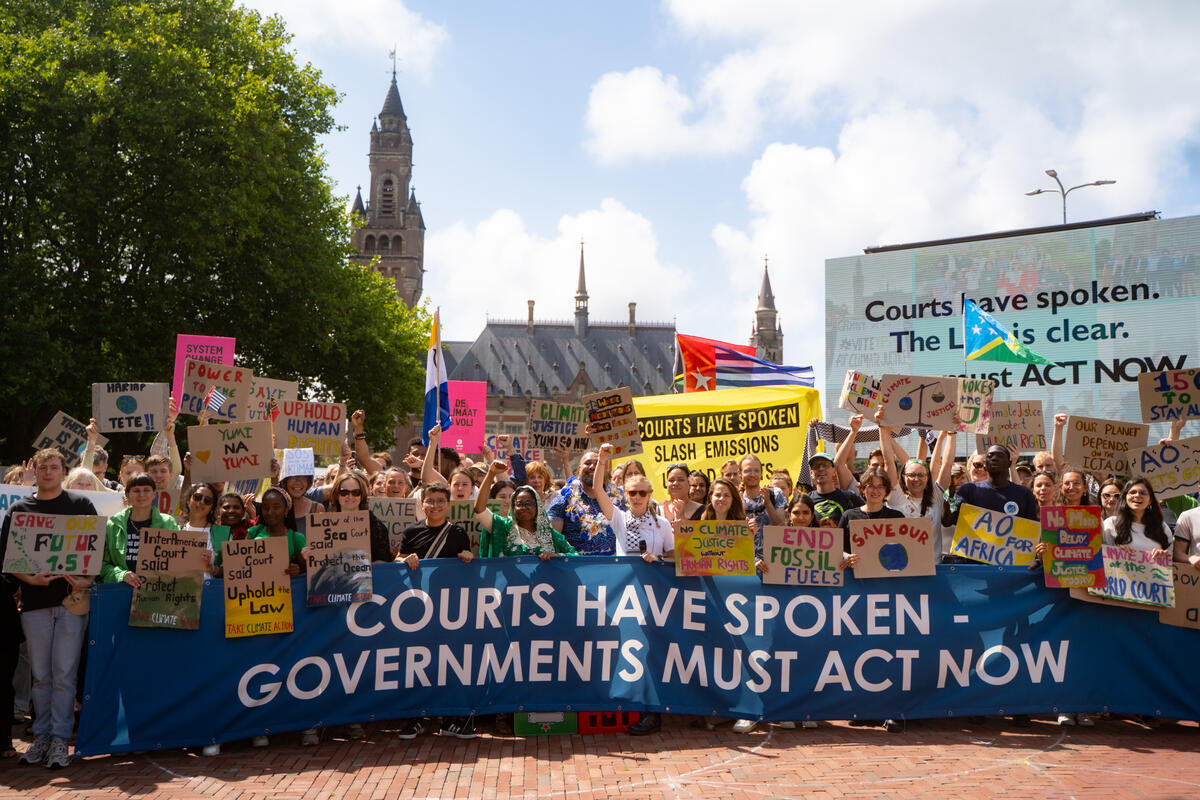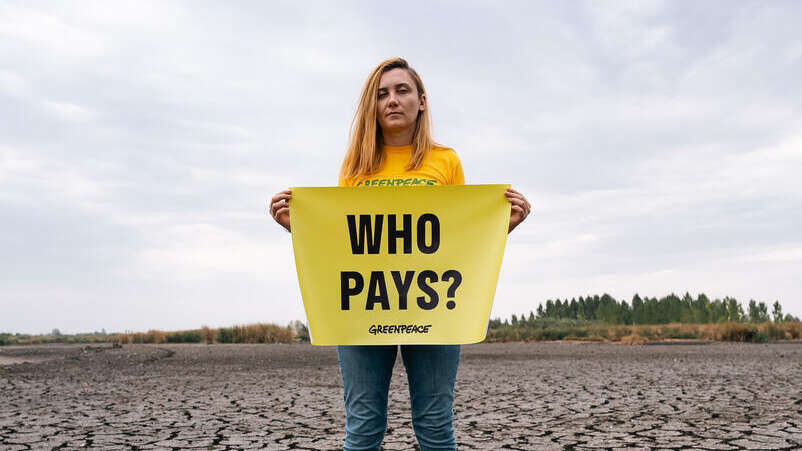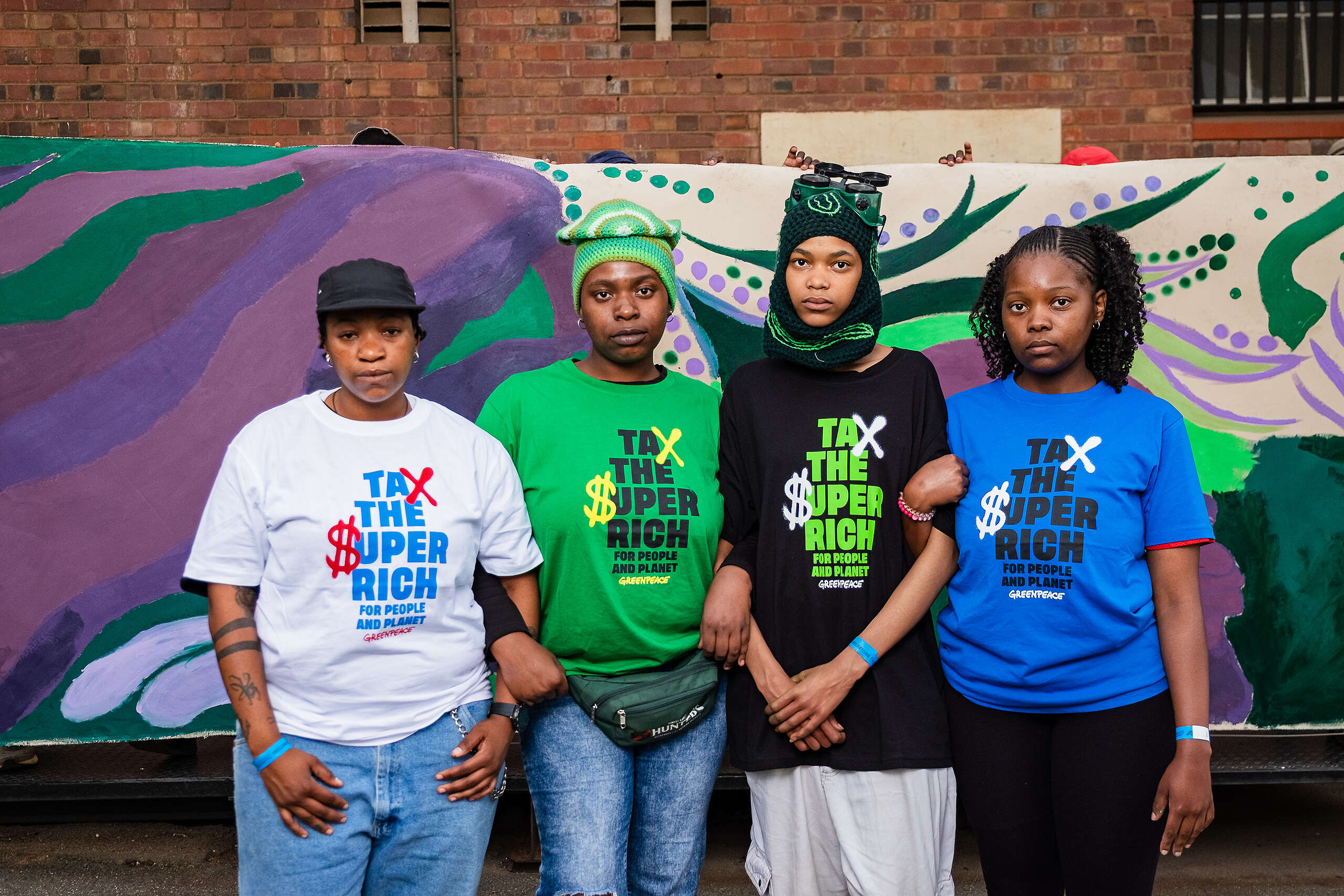Polluters’ Climate Bill
Just five international oil and gas giants – ExxonMobil, Chevron, Shell, BP and TotalEnergies – are responsible for over $5 trillion in projected climate damages based on their emissions since the Paris Agreement was adopted (between 2016 and 2025).
That’s the shocking finding from experts from Stanford and Delaware universities, who used the social cost of carbon methodology, alongside emissions data from the Carbon Majors Database. They calculated the economic value of damages hitting communities between now and 2300, as a result of carbon dioxide that was added to the atmosphere by these five companies over the last decade.
This robust methodology, used regularly by policy analysts and former US administrations, puts a monetary value on the enormous costs that just a small fraction of the fossil fuel industry’s emissions over the last decade are responsible for.
We’re talking about things like human health costs, rising sea levels, disruption to energy supplies, agriculture and labour productivity. It is important to note that no economic metric can ever truly measure the real cost, which is priceless – from lost friends and relatives, to damaged heritage and culture.
Using this calculation, alongside representative examples sourced from the International Disaster Database EM-DAT of some of the most extreme weather events to hit the world over the past 10 years, Greenpeace International has designed a Polluters’ Climate Bill addressed to the fossil fuel industry.

The Polluters’ Climate Bill is travelling around the world – from Climate Week in New York, to Africa Energy Week in Cape Town, Total Energies’ office in Copenhagen, the Fund for Responding to Loss and Damage meeting in Pasay City, Piazza di Spagna in Rome, Altadena in California, the UN Tax Convention negotiations in Nairobi, and COP30 in Belém. Its purpose is to send a simple message to politicians: it is time to make the fossil fuel industry pay up.
The case for making polluters pay
Making polluters pay for climate damages has never been more important in the context of the climate finance outcome at COP29 last year. Tangible plans are now urgently needed, which is why Greenpeace International is calling for a dedicated agenda item at COP30 and beyond – to deliver on the commitment for ‘developed countries’ to mobilise at least US $300 billion per year by 2035 for ‘developing countries.’
Concessional, grant-based public finance commitments also need to scale up to at least US$1 trillion per year for the most vulnerable and least responsible countries and communities, in line with needs. Making polluters pay is an innovative way, grounded in basic principles of justice, to ease pressure on public budgets while delivering on these vital obligations.
Bolder taxes for multinational corporations and high-net-worth individuals (HNWIs) are also vital to help clamp down on their polluting activities. At the moment, global tax rules are full of loopholes, meaning countries are losing US$492 billion in tax a year to multinational corporations and wealthy individuals using tax havens (according to the Tax Justice Network), and annual global revenue losses from profit shifting in the extractives sector – including oil, gas and mining – reportedly amount to at least US$44 billion. Governments are also giving out subsidies for fossil fuel production to the tune of billions of dollars per year. This completely undermines efforts to deliver a global fossil fuel phaseout.
There’s no shortage of cash, given reported profits from ExxonMobil, Chevron, Shell, BP and TotalEnergies alone amounted to almost US$ 800 billion over the last 10 years. This is a matter of political will. That’s why Greenpeace is calling for ambitious taxes on the biggest corporate polluters and the super-rich to unlock the funding that’s urgently needed and speed up an equitable global fossil fuel phaseout.
Growing political momentum

Don’t just take our word for it. Here’s a snapshot of the growing political pressure for action:
- The International Court of Justice Advisory Opinion on climate change concluded that governments must use all policy tools available to them, including taxes, to ensure that the most polluting corporations, such as fossil fuel companies, align their activities with limiting global warming to 1.5ºC and are held to account for their contribution to climate change.
- The 4th UN Financing for Development conference outcome committed to ‘promote progressive tax systems,’ ‘encourage effective taxation of natural resources,’ and promote ‘taxes on environmental contamination and pollution.’
- 38 former world leaders signed a letter calling for permanent polluter profit taxes on high-emitting industries like the fossil fuel industry to deliver climate justice.
- The Africa Group, France, Germany, Kenya, Morocco, Spain and Vanuatu, have spoken out in support of this agenda via their consultation submissions for the UN Tax Convention and the UNFCCC Baku to Belém Roadmap to 1.3 Trillion.
- 8 in 10 people support taxing oil and gas corporations to pay for climate damages, according to a global survey across 13 countries.
Priorities for policymakers
Greenpeace is calling on world leaders and negotiators at COP30 and the UN Tax Convention to urgently act on the following:
- Within climate finance outcomes at COP30: support progressive environmental taxation in line with the Polluter Pays Principle and the Principle of Common but Differentiated Responsibilities and Respective Capabilities (CBDR-RC), in the context of innovative sources of public finance. Ensure there is space under any climate finance (NCQG) agenda item to advance these mechanisms.
- Global Solidarity Levies Taskforce: ensure that the taskforce’s COP30 commitments publicly endorse bold global fossil fuel profit taxation for international climate finance under the UN Tax Convention, alongside bolder fossil fuel profit taxes and extraction levies at the national and regional levels to help communities at home and around the world rebuild from climate disasters and invest in climate solutions.
- Under the UN Tax Convention: support bold commitments on progressive environmental taxation in line with the Polluter Pays Principle and CBDR-RC, and on the effective taxation of high net worth individuals, in line with their ecological debt. Revenues from both commitments should go towards multilateral climate action and sustainable development. Also support the creation of an international Polluter Pays tax on the global profits of highly polluting industries, beginning with fossil fuel companies, channeling revenues from this mechanism towards existing UN climate funds to ensure the countries and communities least responsible for the climate crisis receive support to build resilience.
The fossil fuel industry and other major polluters driving the climate crisis must be held financially accountable for harm caused. COP30 and the UN Tax Convention must take decisive action: it’s time to make polluters pay.
Contact: [email protected] for further information
Rebecca Newsom is the Global Political Lead for Greenpeace’s Stop Drilling, Start Paying campaign, based in London.

Sign the pact, record your story. Join the global movement to make polluters pay.
Join the movement


